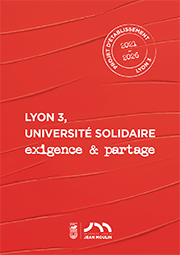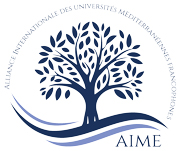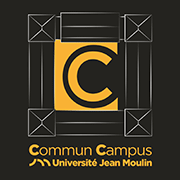AccueilRechercheProgrammes et productions scientifiquesThèsesThèses soutenuesThèses soutenues - 2006-2021Thèses soutenues - 2011
-
Partager cette page
- Recherche,
TEMUR Zedet
L'Université francophone de Galatasaray à Istanbul
Publié le 13 septembre 2011 – Mis à jour le 13 septembre 2011
Thèse en Droit - Histoire du Droit soutenue le 24 juin 2011
L’Université de Galatasaray est une université publique jeune, dont les origines remontent au XVe siècle. Mais elle est avant tout une université francophone.
Comment une université publique à la fois moderne et francophone s’inscrit dans une tradition d’enseignement séculaire ? C’est à cette question que répond cette étude.
Héritière d’une tradition éducative qui commence avec le Mekteb-i Sultani, l’actuel lycée de Galatasaray, l’université constitue le dernier maillon de l’institution Galatasaray. Il s’agit alors d’analyser les circonstances de sa création, son fonctionnement, sa place et son rôle en Turquie comme à l’international.
Née avec l’appui de la Fondation d’éducation Galatasaray, une fondation privée créée au début des années 1980, l’université est l’aboutissement d’une coopération étroite entre la Turquie et la France, ouvrant ainsi une nouvelle page dans les relations bilatérales. Projet inhabituel, à l’heure où l’anglais occupe une place prépondérante dans le milieu scientifique et universitaire, les amoureux de la langue française ont réussi à braver les difficultés politiques, diplomatiques et financières pour mener à terme cette aventure inédite.
Galatasaray est la preuve de l’existence d’une amitié solide entre la France et la Turquie, parfois fragilisée par les dissensions politiques entre les deux pays. Mais par-dessus tout, elle est le fruit d’une politique francophone sans lien avec le passé impérial de la France.
Installée sur les rives du Bosphore, l’université de Galatasaray fait partie aujourd’hui des établissements les plus prestigieux de Turquie. Atatürk disait du lycée de Galatasaray qu’il était « une fenêtre qui s’ouvre à l’Occident ». Il ne serait pas prétentieux de dire aujourd’hui que l’université de Galatasaray est quant à elle « une porte qui s’ouvre à l’Occident ».
The French-speaking University of Galatasaray in Istanbul
Galatasaray University is a young state university, whose origins go back to the 15th century. But it is above all a French-speaking university.
How can a state university, which is both modern and French-speaking, fit into an old traditional institution? This study will provide an answer to this question.
Galatasaray University inherited an educational tradition which started with the Mekteb-i Sultani, the current Galatasaray high school. It is the last link in the chain of the Galatasaray institution.
Let us then analyze the circumstances of its creation, how it works, its place and role in Turkey but also on the world-wide scale.
Born with the support of the Galatasaray Education Foundation, a private foundation created in the early 1980’s, the university is the outcome of a narrow cooperation between Turkey and France, thus opening a new chapter in the bilateral relations. It could be seen as an unusual project, at a time when English is prevailing in the scientific and academic circles: the lovers of the French language succeeded in overcoming the political, diplomatic and financial difficulties in order to carry this completely new adventure through.
Galatasaray shows how strong friendship between France and Turkey is, although it has been sometimes weakened by some political disagreements between the two countries. But above all, it is the fruit of a French-speaking politics which marked a break with the imperial past of France.
Settled on the Bosphore bank , Galatasaray University is nowadays among the most prestigious institutions of Turkey. Atatürk would say about Galatasaray High School that it was “an open window towards the West”. It would not be pretentious today to say that Gatalasaray University is “an open door to the West”.
Mots clés : Université, Galatasaray, Turquie, Istanbul, coopération, français, fondation, étudiant, faculté, langue
Keywords : University, Galatasaray, Turkey, Istanbul, cooperation, french, foundation, student, faculty, language
Directeur de thèse : Nicole DOCKES-LALLEMENT
Membres du jury :
Christian CHENE, Professeur, Université Paris V
Nicole DOCKES-LALLEMENT, Professeur émérite, Université Jean Moulin Lyon 3
Louis-Augustin BARRIERE, Professeur, Université Lumière Lyon 2
Niyasi OKTEM, Professeur, Université Dogus d'Istanbul
Président du jury : Louis Augustin BARRIERE
Mention : Très honorable
Equipe d'accueil : Centre lyonnais d'histoire du droit et de la pensée politique
Comment une université publique à la fois moderne et francophone s’inscrit dans une tradition d’enseignement séculaire ? C’est à cette question que répond cette étude.
Héritière d’une tradition éducative qui commence avec le Mekteb-i Sultani, l’actuel lycée de Galatasaray, l’université constitue le dernier maillon de l’institution Galatasaray. Il s’agit alors d’analyser les circonstances de sa création, son fonctionnement, sa place et son rôle en Turquie comme à l’international.
Née avec l’appui de la Fondation d’éducation Galatasaray, une fondation privée créée au début des années 1980, l’université est l’aboutissement d’une coopération étroite entre la Turquie et la France, ouvrant ainsi une nouvelle page dans les relations bilatérales. Projet inhabituel, à l’heure où l’anglais occupe une place prépondérante dans le milieu scientifique et universitaire, les amoureux de la langue française ont réussi à braver les difficultés politiques, diplomatiques et financières pour mener à terme cette aventure inédite.
Galatasaray est la preuve de l’existence d’une amitié solide entre la France et la Turquie, parfois fragilisée par les dissensions politiques entre les deux pays. Mais par-dessus tout, elle est le fruit d’une politique francophone sans lien avec le passé impérial de la France.
Installée sur les rives du Bosphore, l’université de Galatasaray fait partie aujourd’hui des établissements les plus prestigieux de Turquie. Atatürk disait du lycée de Galatasaray qu’il était « une fenêtre qui s’ouvre à l’Occident ». Il ne serait pas prétentieux de dire aujourd’hui que l’université de Galatasaray est quant à elle « une porte qui s’ouvre à l’Occident ».
The French-speaking University of Galatasaray in Istanbul
Galatasaray University is a young state university, whose origins go back to the 15th century. But it is above all a French-speaking university.
How can a state university, which is both modern and French-speaking, fit into an old traditional institution? This study will provide an answer to this question.
Galatasaray University inherited an educational tradition which started with the Mekteb-i Sultani, the current Galatasaray high school. It is the last link in the chain of the Galatasaray institution.
Let us then analyze the circumstances of its creation, how it works, its place and role in Turkey but also on the world-wide scale.
Born with the support of the Galatasaray Education Foundation, a private foundation created in the early 1980’s, the university is the outcome of a narrow cooperation between Turkey and France, thus opening a new chapter in the bilateral relations. It could be seen as an unusual project, at a time when English is prevailing in the scientific and academic circles: the lovers of the French language succeeded in overcoming the political, diplomatic and financial difficulties in order to carry this completely new adventure through.
Galatasaray shows how strong friendship between France and Turkey is, although it has been sometimes weakened by some political disagreements between the two countries. But above all, it is the fruit of a French-speaking politics which marked a break with the imperial past of France.
Settled on the Bosphore bank , Galatasaray University is nowadays among the most prestigious institutions of Turkey. Atatürk would say about Galatasaray High School that it was “an open window towards the West”. It would not be pretentious today to say that Gatalasaray University is “an open door to the West”.
Mots clés : Université, Galatasaray, Turquie, Istanbul, coopération, français, fondation, étudiant, faculté, langue
Keywords : University, Galatasaray, Turkey, Istanbul, cooperation, french, foundation, student, faculty, language
Directeur de thèse : Nicole DOCKES-LALLEMENT
Membres du jury :
Christian CHENE, Professeur, Université Paris V
Nicole DOCKES-LALLEMENT, Professeur émérite, Université Jean Moulin Lyon 3
Louis-Augustin BARRIERE, Professeur, Université Lumière Lyon 2
Niyasi OKTEM, Professeur, Université Dogus d'Istanbul
Président du jury : Louis Augustin BARRIERE
Mention : Très honorable
Equipe d'accueil : Centre lyonnais d'histoire du droit et de la pensée politique
Documentation
Mise à jour : 13 septembre 2011







